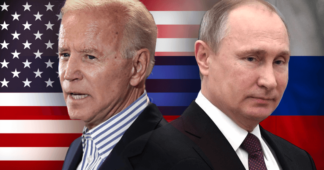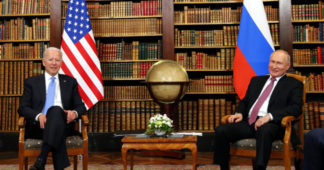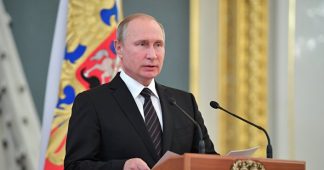The following article published by the Hill is a rather typical example of the extremely toxic atmosphere US media try to crate against President Biden for his openings to Moscow – in reality his effort to save world peace – and how both democratic and republican media want to portray him as “soft” towards Russia, Iran and China. It is also characteristic of the fact most US commentators want to live still in 1991, that is they believe the US is omnipotent. Such dangerous and ridiculous illusions can help lead the whole world to global disaster.
DK
Will Putin sink Biden?
Keith Naughton
Jan 3, 2022
Inflation, coronavirus, unruly progressives – President Biden is in trouble, and his abysmal approval ratings show it. But all his domestic problems could be transient. Inflation could subside, the virus is fading as a health problem, and progressives could rally to Biden when faced with a return of Trump.
But Biden has a serious Vladimir Putin problem, which is likely to get much worse.
Just before Christmas, Putin issued an incredible list of demands to NATO and the West that essentially re-creates the Soviet empire and wrecks the sovereignty of a dozen nations. The toxic combination of Putin having every incentive to pressure NATO, the American mainstream media’s utter humiliation over the collapse of the Trump-Russia collusion allegations and a fumbling, weak-willed, pro-appeasement Biden foreign policy team make a major crisis increasingly likely.
The fundamental problem is Russia and Putin’s weakness – Putin’s problems are deep and growing with his window for action shrinking.
Russia is economically and politically stagnant with a disastrous demographic outlook. The median income has flattened, and Putin is increasing repression in tandem with his sinking popularity, down from 89 percent approval in July 2015 (in the wake of the Crimea annexation) to 63 percent today – and it’s worth noting the polling registers only those willing to admit disapproval in a semi-authoritarian surveillance state. Meanwhile, immigration has steadily fallen, and Russia remains highly dependent on resource extraction.
On their own, these problems are significant, incentivizing xenophobia paired with foreign adventurism to rally domestic political support (nothing new for Putin). But there’s more.
Russia is facing a demographic disaster. In 2020, the largest cohort of women was aged 30-34 (4.3 percent), right before female fertility falls significantly (age 35). After that, the 25-29 cohort collapses to 3 percent and the 20-24 cohort is a mere 2.2 percent – incredibly, a lower percentage than any other cohort up to 75-79. A crash in births is not just likely, it is inevitable.
With a fertility rate of 1.5, Russia is well below natural replacement. And, with births throughout the world falling due to the COVID crisis, Russia is likely to see at least two years of depressed births in the critical 30-34 cohort. Russia was already experiencing natural population losses (over 200,000 in 2019). It is within the realm of possibility that Russia could experience annual natural population losses of nearly 1 million by the late 2020s.
For the past several years, Russia’s demographic problems were papered over by a bulge of 1980s children, immigration from ex-Soviet Republics and the annexation of Crimea. But those gains are over. Darkening economic prospects and repressive politics is not a recipe to attract immigrants or increase fertility.
Presiding over the evaporation of Russia is not something Putin will accept. And yet, forces beyond his control are moving against him. The people of Ukraine reject Russia as a model and seek closer ties with the European Union. Quasi-satellite Belarus remains a Russian ally only via the repression of President Alexander Lukashenko. Putin’s exact future actions are a mystery. Would he effect a de facto union with Belarus, adding 9 million people and/or seize another chunk of Ukraine? Grabbing Crimea gained Russia 2 million.
Putin may figure it’s best to act now. If Biden loses in 2024, any Republican administration would be much tougher. Even the best-case Republican for Putin – Trump – would include a hostile GOP security team. Sens. Ted Cruz (R-Texas), Marco Rubio (R-Fla.) and Tom Cotton (R-Ark.) are positively hawkish toward Russia, and odds are any other legitimate Republican candidate would be as well.
Encouraging Putin is the weakness of the Biden administration. In the most incompetent geopolitical decision since Yalta, Biden dropped sanctions on the Nord Stream 2 gas pipeline, thus allowing Russia to bypass gas pipelines that run through Poland and the Ukraine – removing all leverage those states had over Russia. Not coincidentally, Putin’s ultimatum to NATO came on the heels of completed construction of Nord Stream 2. In return, Biden got nothing but the gratitude of Angela Merkel – who is no longer chancellor.
The mainstream American media and progressives are not helping Biden. After over four years flogging the Trump-Russia collusion story, some have been humiliated by revelations that the so-called “Steele Dossier,” has turned out to be – at best – flawed, more likely, a hoax. The upshot is that outlets like CNN, MSNBC and The New York Times are barely talking about Putin’s audacious gambit or any of his aggressive moves. The topic is fraught for liberals. After all, it was the Obama administration that watched the Crimea annexation and initially refused to help arm Ukraine. Now Putin is making his bid for eastern European hegemony, and Biden seems to be following a similar path of appeasement.
The Trump administration increased sanctions on Russia, sent military aid to Ukraine, and froze Nord Stream 2 – and Putin, for all his bluster, made few aggressive moves in Europe. To any objective observer, it’s the Obama-Biden security team that appears to be riddled with Russian sympathizers.
Beset by domestic political problems and with no pressure from his chastened media and political allies, Biden’s team seems to have chosen to shrink from Putin, sending out the occasional threatening press release.
If so, Biden is sleepwalking toward a disaster.
The American public already has a low opinion of Biden’s leadership abilities. According to the Dec. 22 YouGov poll (a poll with a bit of a Democratic tilt), 62 percent view Biden as “somewhat weak” or “very weak” with independents at 71 percent. Even Democrats – more than a quarter of them, anyway – think of Biden as “somewhat/very weak” at 26 percent – one of his worst numbers in his party. Only 32 percent are “confident” of Biden in an international crisis, including just 23 percent of independents.
While Americans put foreign policy low on their priority list, that is not the case when they perceive a real threat in security. Aggressive moves by Putin could very well change that. But even if the direct erosion in polling is minor, the knock-on political effects would be devastating. Two key threads the Democrats and establishment media have promoted – that Biden is the man to restore trust in America’s allies (especially the Europeans) and that Trump was a Russian pawn – would be left in absolute tatters.
For now, Putin being held at bay – not by Secretary of State Antony Blinken’s blustering, but by an obscure German government agency’s unwillingness to issue a final permit for the pipeline. But Biden can hardly rely on officious German bureaucrats to bail him out forever. He is headed for a confrontation with Putin one way or another, and he does not look up to it at all.
Keith Naughton, Ph.D., is co-founder of Silent Majority Strategies, a public and regulatory affairs consulting firm. Naughton is a former Pennsylvania political campaign consultant. Follow him on Twitter @KNaughton711.
Published at www.msn.com
We remind our readers that publication of articles on our site does not mean that we agree with what is written. Our policy is to publish anything which we consider of interest, so as to assist our readers in forming their opinions. Sometimes we even publish articles with which we totally disagree, since we believe it is important for our readers to be informed on as wide a spectrum of views as possible.











